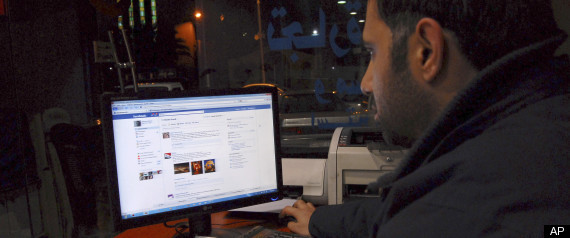"Today, Saturday... popular uprisings in all Syrian governorates," read a posting on The Syria Revolution 2011, which has garnered the support of over 86,000 fans.

The "main goal" of the Facebook group, which has pages in English and Arabic featuring videos of protests and scenes of police brutality, is "freedom in Syria" with postings stating the "intifada against injustice has begun."
The call for fresh protest in Syria, which has been ruled by the Baath party for close to 50 years, came one day after at least 13 people, including two firemen, were killed in clashes between demonstrators and security forces in Homs, the southern town of Sanamen and a Damascus suburb.

An unnamed Syrian official put Friday's toll at 13, but activists said at least 25 people were killed on the Muslim day of prayer and rest.
Protests demanding major change spread across Syria on Friday despite an official announcement of a series of reforms, including the release of all activists detained this month and plans to "study" ending emergency rule which has been in place since 1963.
The southern tribal town of Daraa, near Syria's border with Jordan, has emerged as the hub of the protests and has sustained the most casualties.
Internet users in Syria said Tuesday that Facebook and YouTube were available for the first time in three years amid signs Damascus may be lifting its ban on the popular social networking websites.
The Syrian government does not comment on its Internet restrictions. But several Web users in Syria told The Associated Press on Tuesday that the sites were accessible for the first time in years without having to tunnel through proxy servers. They spoke on condition of anonymity because of security concerns.

The head of the Syrian Center for Media and Freedom of Expression, Mazen Darwish, said he has �semiofficial confirmation� the ban is being lifted. He did not elaborate.
The gesture could be seen as a concession to stave off unrest following popular uprisings in Egypt and Tunisia. But it is not a major compromise by President Bashar Assad, as many Syrians accessed the sites anyway using proxy servers.
Syria has escaped the kind of popular upheaval roiling other Arab countries. An online campaign calling for a �Day of Rage� against Assad�s authoritarian regime last weekend fell flat when no protesters showed up in Damascus.
But in the wake of the unrest in Egypt and Tunisia, Assad told the Wall Street Journal in an interview that he will seek to push through political reforms.
Assad, a 45-year-old British-trained eye doctor, inherited power from his father, Hafez, in 2000, after three decades of authoritarian rule. He has since moved slowly to lift Soviet-style economic restrictions, letting in foreign banks, throwing the doors open to imports and empowering the private sector.
Still, Assad keeps a tight lid on any form of political dissent, closely controls the media and routinely jails critics of the regime.

















